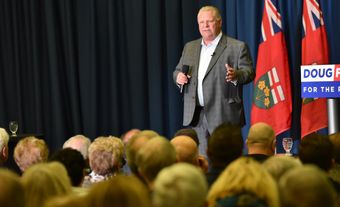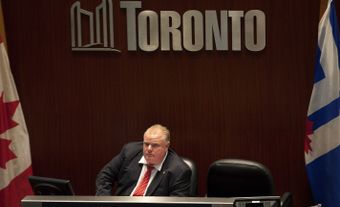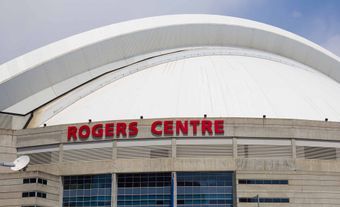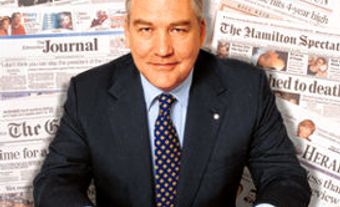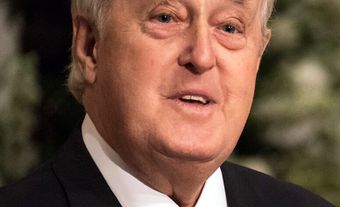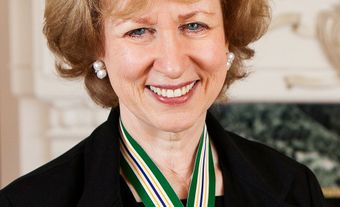John Howard Tory, OOnt, lawyer, broadcaster, business executive, politician, mayor of Toronto 2014–23 (born 28 May 1954 in Toronto, ON). John Tory has been a prominent figure in Ontario business and politics since the early 1980s. He worked behind the scenes on federal and provincial political campaigns before serving as leader of Ontario's Progressive Conservative Party (2004–09) and as an MPP (2005–07). He also served as CEO of Rogers Media Inc. (1995–99) and commissioner of the Canadian Football League (1997–2000). In 2014, he was elected the 65th mayor of Toronto. He handily won a third term in October 2022, but resigned in February 2023 after admitting to an affair with a staff member.
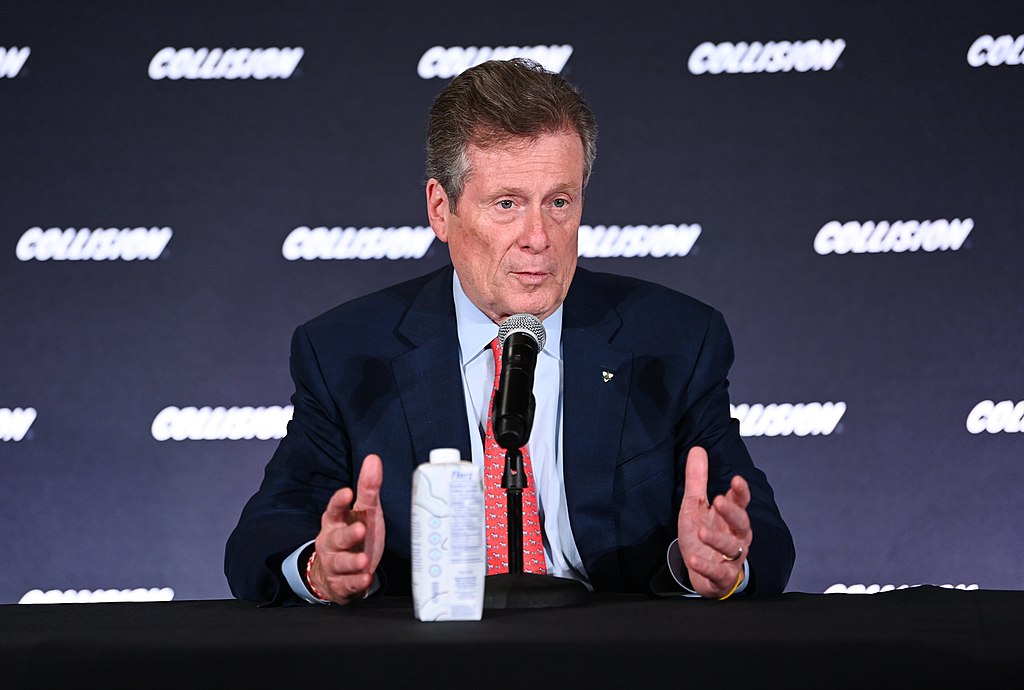
Early Life and Family
John H. Tory was born into a prominent Toronto family with a strong presence in law, business and media. (See also Business Elites.) His grandfather, John S.D. Tory, founded what is now one of the largest law firms in Canada, Torys LLP. Tory’s father, John A. Tory, was also a lawyer. He left the family firm to act as chief financial advisor to Ken Thomson during the expansion of the Thompson Corporation (now Thomson Reuters). He later sat on the board of the fledgling Rogers Communications Inc. at the invitation of family friend Ted Rogers.
John H. Tory attended secondary school at University of Toronto Schools. He earned a Bachelor of Arts degree at the University of Toronto in 1975. He first dabbled in broadcasting while a university student. From 1972 to 1979, he worked as a radio reporter for CFTR and CHFI, AM radio stations that belonged to the Rogers Radio News Network. Tory graduated from York University‘s Osgoode Hall Law School in 1978. He has been married to Barbara Hackett since 1978. They have four children together.
Early Career in Law and Politics
After finishing law school, Tory joined the family firm, then known as Tory, Tory, DesLauriers and Binnington, in 1980. Later renamed Torys LLP, it is one of Bay Street’s most powerful corporate law firms. Tory left the firm in 1981 to make his first official foray into politics. He served as principal secretary to Ontario premier Bill Davis and as associate secretary of the Ontario cabinet until 1985, when Davis retired. Tory then served as an advisor to the Canadian Special Envoy on Acid Rain, which was appointed by the Brian Mulroney government. (See also Acid Rain.)
Tory returned to the family law firm in 1986, rising to the role of managing partner. During the 1988 federal election, Tory worked as operations director for Prime Minister Mulroney’s successful re-election campaign. After Mulroney stepped down in 1993, Tory led the election campaign for Mulroney’s successor, Kim Campbell. During that campaign, Tory approved an infamous attack ad. It emphasized Liberal leader Jean Chretien’s facial paralysis, caused by Bell’s palsy, and asked, “Is this a prime minister?” The Progressive Conservatives were trounced by the Liberals in the election. The PCs fell from 151 House of Commons seats to two.
Business Endeavours
In 1995, Tory became CEO of Rogers Media Inc. following its acquisition of Maclean Hunter, a major media conglomerate. In 1999, he left Rogers Media to become president and CEO of its subsidiary Rogers Cable Inc., at the time Canada’s largest television and Internet provider.
Starting in 1992, Tory served as volunteer chairman of the Canadian Football League. He was then the league's commissioner from 1997 to 2000. He acted as chair of fundraising campaigns for the United Way, St. Michael’s Hospital and the TIFF Bell Lightbox. He was also a founding board member of Greater Toronto CivicAction Alliance (2010–14), a city-building initiative.
Return to Politics
Tory returned to politics in 2003. He ran for mayor of Toronto but lost to David Miller, garnering 38 per cent of the vote to Miller’s 43.3 per cent. Tory then turned his attention to provincial politics. He was elected leader of the Ontario Progressive Conservative (PC) Party in 2004. He won a seat in a 2005 by-election, becoming MPP for the riding of Dufferin Peel Wellington Grey.
In the 2007 election, Tory pledged that a PC government would fund schools for all faiths, not just Catholic schools. The $400 million proposal did not resonate with voters and was blamed for the party’s loss to the Ontario Liberals. Tory, who was then running for a seat in the Don Valley West riding in Toronto, lost that race to Liberal Kathleen Wynne. In 2009, Tory tried to regain a seat in the legislature by contesting a by-election in Haliburton — Kawartha Lakes but was again defeated. He stepped down as party leader the next day.
Tory publicly considered running for mayor of Toronto in 2010 but ultimately chose “to pursue a different course with my life and career.” He said at the time, “you don't need to be a politician to… find ways to contribute.” When asked what voters should look for in the next mayor, Tory told the Toronto Star in January 2010, “I hope as the campaign unfolds that we see the ideas but also the character, the competence, the collegiality that is going to be needed to lead the city effectively, because right now I think city government is dysfunctional.” In October of that year, Rob Ford was elected mayor.
Broadcasting
According to the National Post, Tory was drawn to broadcasting even as a top executive at Rogers, and hosted a community access public affairs show on Rogers Cable. In 2009, after leaving provincial politics, Tory began hosting a daily three-hour afternoon radio show called The Live Drive on CFRB (Newstalk 1010), Canada’s largest talk radio station. He had often said that hosting a radio program was always his dream job. He held the hosting position until 2014, when he stepped down to again run for mayor of Toronto.
Successful Campaign for Mayor (2014)
Tory entered the race for mayor in the final months of Rob Ford’s tumultuous term. By the time the campaign kicked off, Ford, who was running for re-election, had been stripped of key executive powers following an admission that he had smoked crack cocaine while in office. Tory was seen as a steady and experienced alternative who shared Ford’s fiscal conservatism, though not his firebrand approach or personal problems. Tory’s other main opponent was Olivia Chow, a former Toronto city councillor, MP for the New Democratic Party, and the widow of federal NDP leader Jack Layton.
In September, Ford was diagnosed with cancer and was replaced as a candidate by his brother, then-councillor Doug Ford. Despite Doug Ford’s late entry into the race and the perception that he was less popular than his brother, the final result was closer than expected. Tory was elected with 394,775 votes (40.3 per cent). Doug Ford received 330,610 votes (33.7 per cent) and Chow 226,879 (23.2 per cent).
During the election campaign, Tory promised to address Toronto’s transit woes through a 22-stop surface rail line called SmartTrack, and a new subway line into downtown. He also promised to build separated bike lanes and other cycling infrastructure, to bridge the political divide between downtown and suburban residents, and to keep taxes low.
First Term as Mayor (2014–18)
Over the first half of his four-year term, Tory won praise for restoring calm, consistency and a sense of normalcy in the wake of predecessor Rob Ford’s tumultuous term. He restored civility at City Hall and brought a workmanlike, professional approach to the mayor's office. He initiated important reforms on poverty reduction and affordable housing. He also restored several transit services that had been slashed by the previous administration.
Tory was tripped up by the debate over the controversial police practice of “street checks” or “carding” — collecting personal information on people stopped by police — a practice seen as discriminatory against Black people and other minorities. After first supporting carding, Tory changed his mind and said it should be banned. He then passed the issue to the provincial government, which banned the practice in 2017.
Tory was criticized for unveiling a SmartTrack system that was much smaller in scope than what he had promised in the campaign. The original plan of building 22 stations along existing rail lines by 2021 was eventually shrunk to only five stations by 2026, at a cost of $1.46 billion. Construction of the Eglinton Crosstown LRT, begun in 2011 and scheduled for completion by 2020, also faced similar delays. As of December 2022, there was no completion date in sight.
Tory announced on 1 May 2018 that he would run for re-election. By the end of August, polls showed that he had a 58 per cent approval rating, while 65 per cent of respondents said they would vote for him. In the election on 22 October 2018, Tory cruised to victory with 63.5 per cent of the vote. Former chief city planner Jennifer Keesmaat placed a distant second with 23.6 per cent.
Second Term as Mayor (2018–22)
Tory had campaigned for a second term on a platform that included building more affordable housing, investing in arts and culture, improving public transit, and introducing new road safety measures. Construction of the downtown relief line for the Toronto subway was scheduled to be completed by 2029, two years ahead of schedule, thanks to a $162 million budget increase Tory secured in 2019.
Canada’s first case of COVID-19 was recorded in Toronto on 23 January 2020. Tory declared a local state of emergency on 23 March. Schools were closed and teaching was shifted to remote learning. In May, Tory announced the development of the ActiveTO program to create more space for the general public in certain neighbourhoods by closing or restricting major roadways each weekend. Tory implemented mask mandates in indoor public spaces in July. Working closely with the province, he placed Toronto under lockdown from 23 November to 26 December. Tory also oversaw a successful vaccination campaign, including the administration of a world record 26, 771 doses on 27 June 2021, which Tory declared Toronto Vaccine Day.
In June 2020, in the wake of the George Floyd murder in the US and the death of Toronto resident Regis Korchinski-Paquet in the course of a mental health check by police, a motion was introduced in Toronto City Council to defund the Toronto Police Service by $122 million, or 10 per cent of its annual budget, and divert that amount to social services. Tory instead pledged $5 million to equip police officers with body cameras. He also created a Community Crisis Service program that would reform the police by offering “a robust system of social supports and services.” It would also develop “alternative models of community safety response,” including having unarmed social workers respond to non-violent incidents and mental health checks. The program was officially launched in March 2022.
In summer 2021, Tory drew criticism for spending $2 million to have police clear homeless encampments from several parks. Violent clashes occurred between protestors and riot police as encampments were cleared. The city also shut down a local initiative called Toronto Tiny Shelters, which built tiny homes to help people stay warm in the winter. Tory’s administration argued that the shelters, built on city property, were fire hazards, and pointed to a fatal fire at an encampment in February as reason for concern.
By summer 2022, the ActiveTO program had reached a turning point. Cycling advocates and residential groups called for the weekend road closures to be permanent. But some residents and businesses argued that rebounding traffic volumes post-lockdown necessitated a return to normal traffic flows. The Toronto Blue Jays, for example, argued that closing Lake Shore West would hurt attendance at home games. Tory, along with a majority on city council, voted to limit closures on Lake Shore West rather than have them every weekend. However, this led to a conflict of interest complaint against Tory, who is both a paid member of the Rogers family trust and a shareholder of Rogers Communications, which owns the Blue Jays. In December 2022, the city’s integrity commissioner exonerated Tory, finding that he did not break any conflict of interest rules. However, Tory had found himself in a similarly conflicted situation in the fall of 2021, when his position with Rogers put him in the middle of a family feud for control of the company.
Tory often said publicly that he had promised his wife he would not seek a third term as mayor. But in March 2022, he announced that he had received his wife’s blessing to run for re-election. His eventual victory was widely seen as a foregone conclusion. His victory in the election on 24 October proved even more lopsided than in 2018. He won 62 per cent of the vote, while the second-place finisher, progressive urban planner Gil Penalosa, took only 17.9 per cent. Tory won the mayoral vote in all 25 of the city’s wards. Voter turnout was only 29.2 per cent, a record low. Tory’s victory put him on track to serve as mayor for 12 years, which would have made him Toronto’s longest-serving mayor, surpassing Art Eggleton’s 11 years in the role (1980–91).
Third Term (2022–23)
On 8 December 2022, the Ontario government passed legislation giving so-called “strong mayor” powers to the mayors of Ottawa and Toronto. The powers — which include the ability to unilaterally draft and table the city’s budget, to pass measures with the support of only one-third of council, and to veto bylaws approved by council — were designed to help achieve the Ontario government’s goal of building 1.5 million homes in 10 years. The powers were criticized by many as anti-democratic. Ottawa mayor Mark Sutcliffe said that he would not use them. Tory said that he would do so only to advance policies of “citywide importance.”
Tory drew criticism for increasing the city’s police budget by $48.3 million while allocating no new money for community services such as shelters and warming centres for those experiencing homelessness. Many critics pointed to such service cuts as the reason for a 60 per cent-increase in violent incidences on Toronto transit since 2019.
Resignation
On 10 February 2023, the Toronto Star published a story alleging that the 68-year-old Tory had had an affair with a 31-year-old staff member. The affair was said to have begun during the COVID-19 pandemic and was ongoing during the 2022 mayoral campaign, though the staffer had moved on from her role at city hall in early 2021. Shortly after the story was published, Tory admitted it was true. He said that “permitting this relationship to develop was a serious error in judgment on my part… I’m deeply sorry and I apologize unreservedly to the people of Toronto and to all those hurt by my actions… I’ve decided that I will step down as mayor so that I can take the time to reflect on my mistakes and to do the work of rebuilding the trust with my family.”
Tory remained in office until after a council meeting on 15 February to finalize the city’s 2023 operating budget. This drew sharp criticism from many on the left, while many on the right, including Premier Doug Ford, urged Tory to continue as mayor. But Tory announced that he would indeed follow through on his resignation. It became official at 5:00 p.m. on 17 February 2023.
Honours
In 2011, Tory was the inaugural winner of the Diversity Award bestowed by the Black Business and Professional Association’s Harry Jerome Awards. In 2012, Tory was appointed to the Order of Ontario for being “a consummate champion for the Greater Toronto Region as a founding member and chair of CivicAction.” That year, he also received the Queen Elizabeth II Diamond Jubilee Medal.

 Share on Facebook
Share on Facebook Share on X
Share on X Share by Email
Share by Email Share on Google Classroom
Share on Google Classroom
